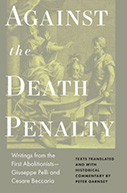Against The Death Penalty: Writings From The First Abolitionists – Giuseppe Pelli And Cesare Beccaria

Authors: Giuseppie Pelli (Author), Peter Garnsey (Editor)
Publisher: Princeton, NJ: Princeton University Press 2020. 226p.
Reviewer: Marc Bookman | May 2021
There are few things more mortifying than looking back at your high school yearbook and reading the quote you thought so profound at the time. My own selection (“Everything has been said,” Jean de la Bruyére) had a certain irony to it, as I knew even then that I wanted to be a writer. At least I didn’t quote Led Zeppelin; and in retrospect there was one added benefit to my selection. It turned out to be true, at least as far as the moral argument against the ultimate punishment is concerned.
Against The Death Penalty, edited, translated and with commentary by Peter Garnsey, takes a deep dive into the first serious critiques of capital punishment, by the virtually unknown Giuseppe Pelli, and by the founding father of modern criminal jurisprudence, Cesare Beccaria. Both lived during the same era and in the same country, and both wrote their treatises within a few years of the other; and yet each man approached the question of abolition from a different direction. Read back to back, however, the arguments (with two obvious exceptions) cover the waterfront. And while both men are of their time and place – Italy in the mid-1700s – echoes of their reasoning continue to resonate today.
Although Pelli’s work only came to the public’s attention three decades ago, while Beccaria’s book made an immediate international impact when it was published in 1764, Pelli’s discourse was authored first. He addresses the subject moralistically, and not without his share of self-righteousness. “I am not animated by a spirit of censure, nor of disapproval of our customs or our laws. My complaint, rather, is at the blindness of those who have believed that the death of the vicious would extinguish vice.” He is particularly condemnatory of retribution, which he explicitly and rightly refers to as vengeance or revenge, declaring the concept “useless, inhumane and vile.”
Pelli is also, on occasion, prescient in his analysis. Noting that the most despotic governments utilize the death penalty excessively, he concludes that “if the death penalty serves to fuel fear of tyrants, then it cannot be the punishment most appropriate in societies where moderation reigns.” Almost two centuries later, Germany applied precisely the same reasoning when abolishing the death penalty after the horrors of the Holocaust.
Writing from a deeply religious – and specifically Catholic – perspective, Pelli’s theses are a virtual disquisition on the nature of man, and his view is a dark one:
Revenge cannot be an end of punishment, though it might be sweet pleasure in a barbarous heart…There can be no more than three legitimate ends of punishment…The first end is to reform the criminal, the second to guarantee security and the last to provide an example to others…That reform is a most legitimate end of punishment is proven by the advantage that accrues not only to the chastised but also to society. The fact is that men are evil.
According to Mr. Garnsey, who has carefully read Pelli’s diary spanning almost half a century, he was a man very conscious of his place in the conservative Catholic Church of mid-18th century Italy, and concerned that his position against the death penalty might be taken poorly by church elders. In the end, though, Pelli is very much a humanist: “Certainly if I have succeeded in saving the life of one of my fellow men at any moment of my life, I will be happier than if I have signed the death warrant of anyone, however villainous he may be, because I will have answered the call of mercy rather than followed the dictates of rigorous justice.” If I didn’t know better, I’d have sworn Clarence Darrow had familiarized himself with Pelli’s dissertation before making his famous closing argument in the Leopold and Loeb case.
Cesare Beccaria’s condemnation of the death penalty was considerably briefer than Pelli’s, occupying only one lengthy chapter of his landmark On Crimes And Punishments; and given his liberalizing impact on criminal justice theory, it might be reasonable to conclude that he was every bit the humanitarian Pelli was. But Beccaria’s argument against capital punishment, at least in part, is not that it is inhumane, but that there are worse alternatives available:
To anyone who says that life-long slavery involves as much suffering as death and is thus equally cruel, my response is that if you add up all the miserable moments of slavery it will perhaps turn out to be even more cruel. These moments are extended over a lifetime, however, whereas the death penalty makes its full impact in one single moment. The advantage of the penalty of slavery is that it strikes terror in the spectator more than in the sufferer. That is because the thoughts of the former are directed toward the total sum of moments of misery, whereas the latter is conscious of the unhappiness of the present moment and is not distracted by the future.
Yet Beccaria’s approach to punishment generally, and the death penalty in particular, is a modern one. He believes that a criminal justice system is justified only if it produces the “least possible evil;” indeed, one can almost hear a defense of decarceration in his writing. But his claim of “least possible evil” must be read in the context of the 18th century, where capital punishment was far more common than today, and available for many crimes besides murder. Like Pelli, he rejects retribution as a worthwhile goal of a justice system. For Beccaria, there are only two questions to be asked about punishment: is it necessary, and is it useful? His answer to both questions is no:
The most powerful check on crimes is not the terrible but passing spectacle of the death of a criminal, but the long-drawn-out example of a man deprived of liberty, who, transformed into a beast of slavery, reimburses society by hard work for the offence he has caused. Much more potent than the idea of death, which always seems dim and distant, is the refrain within ourselves, efficacious because it often recurs: ‘I too will be reduced to this never-ending and miserable condition if I commit like crimes.’
One cannot miss Beccaria’s almost casual use of the concept of slavery, and contextualizing his thinking does little to justify the harshness of his perspective. Mr. Garnsey addresses it head on, noting that Beccaria knew exactly what slavery meant as a legal concept – that when a person is enslaved he is no longer a person, he is a thing. (In fairness to Beccaria, however, he believes that slavery as punishment for crime is the only just slavery.) Clearly the modern concept of prisoner’s rights would be utterly foreign to him. Garnsey spends fruitful time discussing Beccaria’s thoughts about hard labor and corporal punishment, and the influence such thinking had on colonial America.
A significant percentage of Against The Death Penalty is the actual text – Pelli writing far more on the subject than Beccaria – but Mr. Garnsey doesn’t play second fiddle. While recognizing that he is not the star of the show, his contextualization of the two men, historically and philosophically, is hugely helpful. This reviewer is not sufficiently versed in 16th and 17th century philosophers to competently assess or even summarize the influences of Montesquieu, Grotius, or Helvetius on the two authors; but Garnsey’s chapter on Beccaria and Thomas Jefferson and his discussion of forced labor and penal servitude are fascinating. His brief explication of the Thirteenth Amendment, abolishing slavery and involuntary servitude “except as a punishment for crime,” is must reading as well.
There is one significant disappointment in this book, but not of Mr. Garnsey’s making. When Pelli read Beccaria’s historic text, he was moved to write the better-known author, and a brief exchange between the two followed. Regrettably, the letters did not engage in a thoughtful give and take about capital punishment; instead the two spent their time fulsomely praising each other for no particular purpose. The only relevant information to be garnered from the letters is Pelli’s explanation for his failure to publish his dissertation, that he had obtained a judgeship of some sort: “I was promoted to a position in which from time to time I am obliged to give a judicial opinion on the punishment of criminals.” It was the sort of answer one might hear from a modern-day Supreme Court nominee.
Against The Death Penalty is not for everyone. Garnsey himself notes that from a modern perspective, the arguments for abolition by these two men are somewhat dated, relying as they do on outworn concepts like the state of nature and the social contract (although maybe all of us might benefit from a refresher on the social contract); and, as noted above, it must be kept in mind that the death penalty was used for a wide range of offenses in addition to murder in the 1700s. But the reasoning behind those arguments – the failure of the death penalty to deter, the inhumanity of retribution – continue to carry considerable moral weight. The two obvious exceptions referenced earlier and not addressed in this book – the excessive costs of the modern death penalty and the racial discrimination that is baked into American capital punishment – don’t become issues of concern for abolitionists until both men are long gone. Yet even discrimination enters the discussion, albeit in a very different context, as Pelli notes the inconsistent application of the death penalty across different crimes and jurisdictions.
When all is said and done, Mr. Garnsey has done an outstanding job of organizing, contextualizing, and commenting on difficult material. To fully grasp the radical nature of the authors’ critiques is to put oneself in a time when adultery and theft often carried death sentences, and Mr. Garnsey fairly achieves that goal. While this book will be of greatest interest to staunch abolitionists and historians of the Enlightenment, it also serves as a bookmark. When the death penalty ends for good, as it inevitably must, Mr. Garnsey will have thoroughly and carefully noted the beginning of the end.
Marc Bookman, Executive Director of the Atlantic Center for Capital Representation


